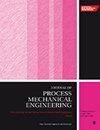A comprehensive approach to enhance wood cutting productivity: Integration of spherical fuzzy DEMATEL and artificial neural networks
IF 2.2
4区 工程技术
Q2 ENGINEERING, MECHANICAL
Proceedings of the Institution of Mechanical Engineers, Part E: Journal of Process Mechanical Engineering
Pub Date : 2024-05-31
DOI:10.1177/09544089241253083
引用次数: 0
Abstract
Productivity plays a pivotal role in profitability and success of business. In this study, the wood cutting activity in Indian sawmills is selected. This study replicates the novel approach by integrating spherical fuzzy DEMATEL (Decision Making Trial and Evaluation Laboratory) and artificial neural networks (ANN) to improve the wood cutting productivity in Indian sawmills. The measure of betterness is selected as net productivity rate (NPR), a time-based labor productivity measure. The methodology unfolds in two crucial steps. First, SF-DEMATEL is employed to unearth influential factors affecting wood cutting, delving into their interrelationships through fuzzy logic. This process provides relationships between key determinants and their interconnected dynamics. Secondly, an ANN, a machine learning algorithm, is harnessed to predict wood cutting performance based on these identified factors. The ANN is trained using historical or simulation data, paving the way for predictions under diverse scenarios. The novelty of this approach lies in its holistic precision. The results showcase that lifting index and log weight emerge as primary influencers on productivity, with NPR, occupational risk index, and perceived exertion ranking lower. In the grand tapestry of factors, the study unveils universal driving forces, such as the weight of the log and lifting index. The ANN model, attaining a remarkable RMSE = 0.0478 and R提高木材切割生产率的综合方法:球形模糊 DEMATEL 与人工神经网络的整合
生产率对企业的盈利和成功起着举足轻重的作用。本研究选择了印度锯木厂的木材切割活动。本研究通过整合球形模糊 DEMATEL(决策试验和评估实验室)和人工神经网络(ANN),复制了一种新方法,以提高印度锯木厂的木材切割生产率。更好的衡量标准是净生产率(NPR),这是一种基于时间的劳动生产率衡量标准。该方法分为两个关键步骤。首先,采用 SF-DEMATEL 来发掘影响木材切割的因素,通过模糊逻辑深入研究这些因素之间的相互关系。这一过程提供了关键决定因素之间的关系及其相互关联的动态。其次,利用机器学习算法 ANN,根据这些确定的因素预测木材切割性能。使用历史数据或模拟数据对 ANN 进行训练,为在不同情况下进行预测铺平道路。这种方法的新颖之处在于其整体精确性。研究结果表明,提升指数和原木重量是影响生产率的主要因素,而全国人口普查指数、职业风险指数和体力消耗指数则排名靠后。在众多因素中,研究揭示了普遍的驱动力,如原木重量和提升指数。ANN 模型在训练集和训练数据中的 RMSE = 0.0478 和 R2 = 0.9783,以及在测试数据中的 RMSE = 0.0487 和 R2 = 0.9727,均达到了很高的水平。这有助于对模糊 DEMATEL 和 ANN 得出的因子进行综合排名比较。总之,模糊 DEMATEL 和 ANN 的融合揭示了木材切割动态的复杂性。通过识别关键因素和预测性能,该方法为提高木材切割质量和效率提供了一个变革性途径,从而提升了木材加工行业的整体生产力。
本文章由计算机程序翻译,如有差异,请以英文原文为准。
求助全文
约1分钟内获得全文
求助全文
来源期刊
CiteScore
3.80
自引率
16.70%
发文量
370
审稿时长
6 months
期刊介绍:
The Journal of Process Mechanical Engineering publishes high-quality, peer-reviewed papers covering a broad area of mechanical engineering activities associated with the design and operation of process equipment.

 求助内容:
求助内容: 应助结果提醒方式:
应助结果提醒方式:


